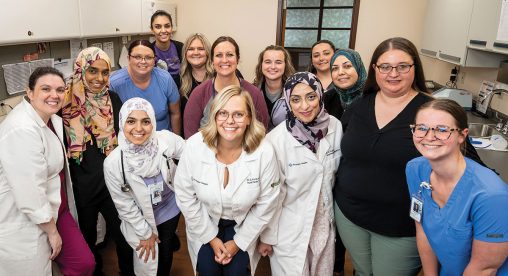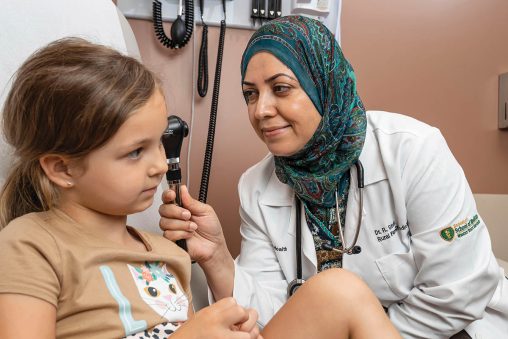 Experienced physician appointed for first-ever dual leadership role
Experienced physician appointed for first-ever dual leadership role
In March 2025, Raj Mitra, M.D., began serving as dean of the Boonshoft School of Medicine and chief academic officer at Premier Health. He is the first to hold the new dual role responsible for driving ground-breaking initiatives through a more integrated delivery of academic and clinical services at both institutions.
Mitra came to the Miami Valley from Florida, where he served as professor of medicine and associate dean of clinical affairs at the University of Central Florida (UCF) College of Medicine and chief medical officer at UCF Health.
“I was particularly inspired by the shared mission of the two organizations to support the community through excellence in innovative research, exceptional teaching, and world-class patient care,” Mitra said. “This is particularly timely in southern Ohio and throughout our country, where we will face a substantial physician shortage over the next decade.”
A nationally recognized expert in rehabilitation medicine and pain management, Mitra has made significant contributions to research, advising, and policy development, particularly in addressing the nation’s opioid crisis.
Mobile street medicine program helps underserved patients in Dayton
The Boonshoft School of Medicine provides health care services to people with substance use disorders through a mobile community-based health care, or street medicine, model.
The Dayton Street Medicine Project is a collaboration with the Dayton Dream Center, a nonprofit outreach center on East Third Street, and Premier Health’s Mobile Clinic program.
“The idea of street medicine is to provide the lowest possible barrier to quality care, which often means meeting people where they’re at,” said Marietta Orlowski, Ph.D., chair of population and public health sciences.
Funded by a two-year $293,968 award from the OneOhio Recovery Foundation, the project also provides training opportunities for Wright State medical and behavioral health students to work with individuals impacted by substance use and addiction.
“These are rich, life-changing learning experiences and many will continue to work and make a difference in this space,” Orlowski explained. “It’s an opportunity to train the future generation of the workforce that will really change the ecosystem of care and health.”
Residency program addresses the shortage of physicians in rural Ohio communities
Wright State’s rural family residency program is working to address a shortage of physicians in rural Ohio communities in a collaboration with Miami Valley Hospital, Family Health Services of Darke County, and Wayne Health Care of Greenville.
The residency program’s goal is to train family medicine physicians who will establish medical practices in rural Ohio, where health systems struggle to find enough physicians to meet the needs of their communities.
“We have a one plus two program, which gives our residents the best of both worlds,” said program director Carlos Menendez. “They are able to take rotations their first year in the world-class facilities of Miami Valley Hospital and Dayton Children’s Hospital before completing their second and third years in a rural setting.”
The program has a full cohort of nine residents. The first cohort of three residents is expected to graduate in June 2026.
M.D. in Three program allows students to earn their degrees faster
Thanks to the M.D. in Three program, students in the Boonshoft School of Medicine have the option of saving money, graduating sooner, and practicing medicine earlier.
For Cole Stevens, the M.D. in Three program has enhanced his knowledge while reaffirming his commitment to practicing family medicine in the future.
“Physicians who are truly passionate about their careers often emphasize finding a ‘home’ in medicine,” said Stevens. “The family medicine M.D. in Three program is where I found a community of physicians dedicated to benefiting patients on the front lines of primary care, aligning with my professional interests and making medicine feel like home.”
“This is a great program that allows students interested in primary care to focus their curriculum so they finish in three years,” said Laurie Bankston, M.D., assistant professor of family medicine. “This saves them a full year of tuition and helps fill primary care workforce needs even faster. It’s a win for students and the community.”
This article was originally published in the 2025 issue of the Wright State Magazine. Read more stories at wright.edu/magazine.


 Glowing grad
Glowing grad  Wright State’s Homecoming Week features block party-inspired events Feb. 4–7 on the Dayton Campus
Wright State’s Homecoming Week features block party-inspired events Feb. 4–7 on the Dayton Campus  Wright State music professor honored with Ohio’s top music education service award
Wright State music professor honored with Ohio’s top music education service award  Wright State’s Industrial and Human Factors Engineering program named one of top online graduate programs by U.S. News
Wright State’s Industrial and Human Factors Engineering program named one of top online graduate programs by U.S. News  Student-run ReyRey Café celebrates decade of entrepreneurship at Wright State
Student-run ReyRey Café celebrates decade of entrepreneurship at Wright State 